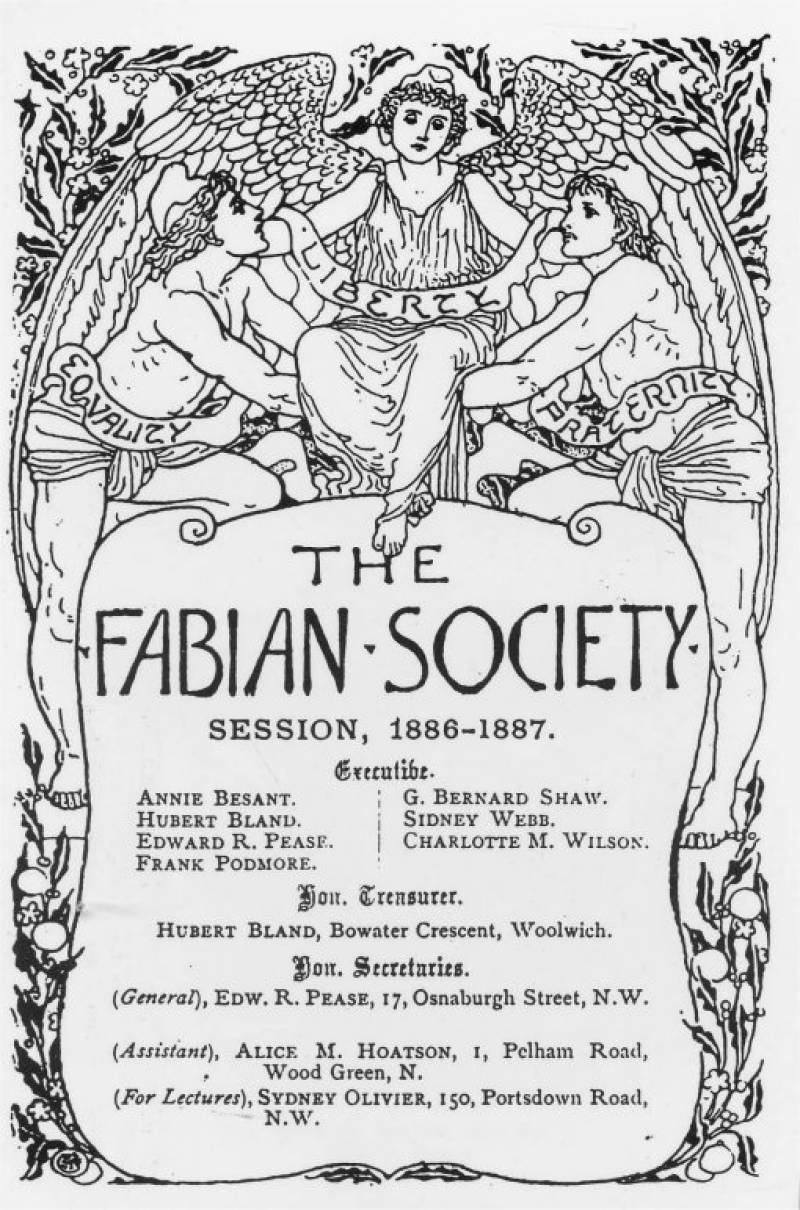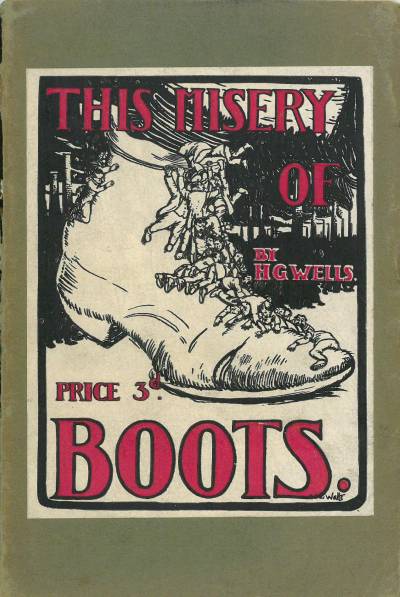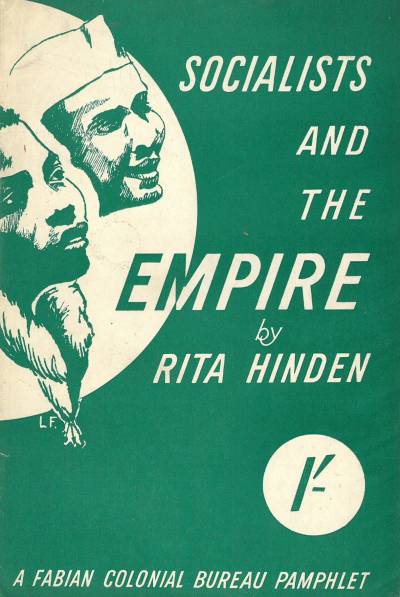 The Fabian Society, set up in January 1884, operated on the basis of fortnightly meetings addressed by a speaker - these included George Bernard Shaw, Annie Besant and Hubert Bland. The Society published these early talks in the Fabian essays in socialism which brought about a demand for expansion outside of London. In the period between 20 September and 27 October 1891 sixty lectures were delivered in Liverpool, Hebden Bridge, Preston and Salford and throughout Lancashire and Yorkshire.
The Fabian Society, set up in January 1884, operated on the basis of fortnightly meetings addressed by a speaker - these included George Bernard Shaw, Annie Besant and Hubert Bland. The Society published these early talks in the Fabian essays in socialism which brought about a demand for expansion outside of London. In the period between 20 September and 27 October 1891 sixty lectures were delivered in Liverpool, Hebden Bridge, Preston and Salford and throughout Lancashire and Yorkshire.
The legacy of this period was the establishment of the ‘Fabian Tract’ as the principal vehicle for Fabian Society ideas. Many of the tracts concentrated on establishing a framework of facts for local campaigners and arming candidates with proposals for ‘municipal socialism’. The reasonableness of such pamphlets was intended to act as a counter to what was seen as the ‘wilder’ end of Socialism embodied by the Social Democratic Federation (SDF).
In January 1893 the Fabian Society attended the Bradford Conference which had been called to set up an independent working class political party. The Society hoped to convince delegates of the need to stay with Liberalism and adopt a policy of permeation. Such was the strength of feeling for the establishment of a working class political party at the conference, however, the Fabian Society realised that they had little support. Instead the Independent Labour Party (ILP) was formed.
In 1894, a substantial sum was left to the Society to further ‘its propaganda, objects and socialism in any way it deemed advisable’. Half of that sum went to the setting up an institution for economic research and teaching; that became the London School of Economics and Political Science (LSE).
The Society incorporated the emancipation of women into its programme but faced with any difficult decisions it tended to set up investigating committees, rather than rushing to make changes. One idea which the Fabian Society promoted with some enthusiasm was that of eugenics, or Social Darwinism. Allied to this was the view advanced by Sidney Webb that the number of working class and ignorant people was growing uncontrollably. This view was expressed in a Fabian Pamphlet of 1907 – The decline of the birth rate.
Although the Fabian Society did not feel that it was necessary to comment on the First World War, it was quick to try and understand the impact of the Russian Revolution in 1917. The Society sent Julius West to the Soviet Union to report back and his observations were contained in the Fabian Tract The Russian Revolution and British democracy.
 Post-WW1, the extension of democratic control in industry, more secure employment, social insurance and immediate nationalisation formed the basis of Fabian demands.
Post-WW1, the extension of democratic control in industry, more secure employment, social insurance and immediate nationalisation formed the basis of Fabian demands.
The first Labour Government of 1923 was led by Ramsay MacDonald, a former member of the Fabian Society, and included a number of Fabians, notably Sidney Webb and Margaret Bondfield. Taking office at a time of recession, the Labour administration achieved little.
The 1926 General Strike exposed once more the fact that such an event was deemed to be outside of the remit of the Society. This led to a sharp fall in membership which lasted until G.D.H. Cole re-joined the Society in 1928. Cole attempted to re-energise the Fabians and set up the New Fabian Research Bureau in 1931.
The organisational changes in the Society encouraged a new generation of Fabian thinkers who took a more critical stance on the performance of the Labour Party in office. They demanded a clear, radical plan of action, including the abolition of the House of Lords, nationalisation of the Bank of England, and a national industrial planning policy.
The 1945 Labour Government was led by a former chair of the New Fabian Research Bureau and many of the policies enacted were long-term Fabian aspirations. As Prime Minister, Clement Attlee placed great emphasis upon the use of experts and advisory committees and, in re spect of foreign policy, relied on the work of the Fabian International Bureau.
spect of foreign policy, relied on the work of the Fabian International Bureau.
Towards the end of the 1950s there emerged a new generation of thinkers concerned with whether socialism would prosper in an ‘affluent’ society. In the 1950s and the early 1960s the principal Fabian figures were those who went on to form the 1964 Labour administration: Denis Healey, Roy Jenkins and Harold Wilson.
The Society began to be at the centre of the concern that some felt about the direction of the Labour Party, with the most prominent group forming around Roy Jenkins, Shirley Williams and David Owen. Members voted to disenfranchise those who formed or became members of other parties such as the SDP.
However, by the 1990s the Fabian Society had a considerable influence upon the ‘modernisation’ of the Labour Party. It suggested changes in the constitution which led to the introduction of ‘one member one vote’ and pressed for the removal of Clause IV. The society published works by Tony Blair, Gordon Brown and Peter Mandelson.
The 1997 Government contained around 200 Fabian MPs in the Commons, including just about the whole cabinet, such as Clare Short, Robin Cook, Jack Straw & David Blunkett.
The Fabian Society still exists today. Although there are now a large number of ‘think tanks’ seeking to influence public policy, the Society contends that it alone is democratically controlled by its members.
The Society's archives are held at the London School of Economics, including a comprehensive digital archive.The Working Class Movement Library also has a wealth of material to come in and read on the history of the Fabian Society and many of the people involved. We also have an excellent collection of significant Fabian tracts and other publications.
Selected resources are listed here, alongside a longer version of the above history of the Fabian Society, in four parts:
The early years - download here
The history of the Fabian Society [A56] by Edward Pease was written in 1916 and Bernard Shaw wrote The Fabian Society: an early history in 1892 [in Fabian Tracts]. The Library also has Educate, agitate, organize: 100 years of Fabian Socialism by Patricia Pugh [H23] and The first Fabians by N & J Mackenzie [E03]. A more recent work by C E Hill (1996) is available entitled Understanding the Fabian essays in Socialism (1889) [M31].
Some early works available in the Library include What Socialism means by Sidney Webb, 1888 [J21/2], The basis of the Fabian Society [Fabian Society – Box 2] and Fabian Society – objects & methods by Sidney Webb [Fabian Society – Box 1]. Of particular note is a paper read to the Manchester & District Fabian Society on 10 February 1891 by R J Derfel [Socialism – Box 1].
The Library also has a range of early Fabian Society annual reports [Fabian Society – Box 1].
1893-1918 - download here
The Library has a large selection of Fabian Tracts to come in and read from this period which can be found at shelf marks E05, J18/5 and AG Fabian Tracts. The story of Fabian Socialism by Margaret Cole [A49] offers a useful guide to this period as does Fabian Socialism & English politics by A.M. McBriar [A49].
1919-1939 - download here
Material to come in and read on the Society in the interwar period includes works by G.D.H. Cole on Guild Socialism, which are to be found in the Fabian Society collection [J18/6] or in Guild Socialism re-stated [A56]. Sidney & Beatrice Webb’s work The decay of capitalist civilisation is found at A37 and The constitutional problems of a co-operative society at J18/6, along with a number of Fabian tracts. Democracy for India by H.N. Brailsford one of many works in the boxes at AG – Fabian Tracts.
Post-WWII to the present day - download here
A small selection from Shelfmark AG – Fabian Tracts relating to this period:
Labour choices 1983: Roy Hattersley, Eric Heffer, Neil Kinnock & Peter Shore.
Future of Socialism 1986: Neil Kinnock.
Can Labour win again? 1979: Austin Mitchell.
Winning for women 2000: Harriet Harman.
Labour’s next steps 1997: Peter Mandelson
Two works by Tony Blair, Socialism (1994) and The third way (1998).
Works released by the New Fabian Research Bureau, for example Facts for Socialists from 1944, can be found under Shelfmark AG – Fabian Research.
Finally, the Library has a large number of histories of the Fabian Society, including The story of Fabian Socialism by Margaret Cole [A49] and History of English Socialism by George Benson [A42].
.
